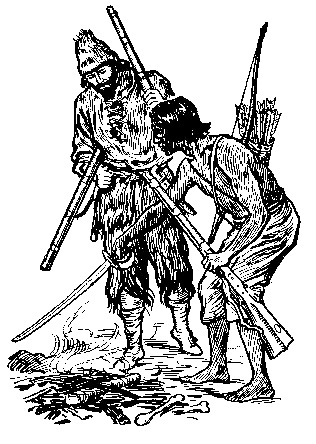But of course he did not understand. Then I motioned to him with signs. He came a little way and then stopped. He came a little farther and stopped again. He was trembling like a leaf.
No doubt he was afraid that he would be killed as his two pursuers had been.
I spoke kindly to him and made signs that I would not hurt him. He came nearer and nearer, trembling, and kneeling down at almost every step.
I smiled; I looked as pleasant as I could; I made still other signs.
He came quite close to me. He laid his head upon the ground. He took hold of my foot and set it on his neck. This was his way of saying that he would be my slave forever.
I took hold of his hand and lifted him up. I spoke kindly to him.
Thus I at last got hold of a savage, as I had so long desired.
I AM PLEASED WITH MY MAN FRIDAY
(я доволен моим слугой Пятницей; man — человек; слуга)
THE savage spoke to me (дикарь заговорилсо мной; to speak — говорить). I could not understand his words (я не мог понять его слов), but they were very pleasant to hear (но они были приятными на слух/было приятно их слышать). For it had now been more than twenty-five years since I had heard the sound of a man"s voice (так как было = прошло уже более двадцати пяти лет с того времени, когда я слышал звук человеческого голоса).

He pointed to the two savages (он указал на двух дикарей) who had been pursuing him (которые /ранее/ преследовали его). They were lying on the ground where they had fallen (они лежали на земле, там, где они упали). Both were quite dead (оба были совершенно мертвы).
He could not understand how I had killed the second savage (он не мог понять, как я убил второго дикаря) when he was so far away from me (когда он был так далеко от меня). He made signs that I should let him see whether his enemy was really dead or only pretending to be so (он делал знаки, что я должен дать ему посмотреть, действительно ли его враг был мертв или только притворялся быть таковым).
I told him, as well as I could (я сказал ему, насколько смог: «так хорошо, как я мог»), that he might go to him (что он может пойти к нему). He ran to the fallen savage and looked at him (он подбежал к упавшему дикарю и посмотрел на него). He turned him first on one side and then on the other (он перевернул его сначала на одну сторону, а затем на другую). He seemed very much puzzled (он казался очень озадаченным; puzzle — вопрос, ставящий в тупик; головоломка, загадка; to puzzle — приводить в затруднение, ставить в тупик; озадачивать).
Then he picked up the savage"s bow and arrows (затем он подобрал лук и стрелы дикаря) and brought them to me (и принес их мне; to bring — приносить).
I turned to go back to my castle (я повернулся, чтобы идти обратно в замок) and beckoned him to follow me (и поманил его последовать за мной).
He stood quite still for a moment (он стоял совершенно неподвижно какое-то мгновение) and then pointed again to the bodies on the ground (а затем указал опять на тела на земле). By signs he asked me if he might bury them (знаками он спросил меня, мог ли похоронить их), lest the other savages should come up and find them there (чтобы другие дикари не смогли прийти и найти их там). I answered by signs (я ответил знаками) and gave him leave (и дал ему разрешение).
The work was quickly done (работа была быстро сделана). With a sharp stick (острой палкой) and his big hands (и своими большими руками; hand — кисть руки; ладонь) he soon dug two big holes in the sand (он вскоре вырыл две большие ямы в песке). He laid the bodies in them and covered them up (он положил в них тела и покрыл = засыпал их; to lay — класть). Then he smoothed the sand (затем он разровнял песок) and patted it down so (и прибил/утрамбовал его так; to pat — похлопывать; поглаживать; шлепать; бить, ударять /плоским или тупым предметом/) that no one could see that it had been touched (что никто не смог бы увидеть, что он был тронут = что здесь рыли).
Having thus put the two savages out of sight he turned to me again (убрав таким образом двоих дикарей из виду, он снова повернулся ко мне). I motioned him to follow me (я показал ему знаком следовать за мной). But on second thought (но, поразмыслив: «на второй мысли») I did not go back to the castle (я не пошел обратно в замок). I led him far into the woods (я отвел его далеко в лес; to lead — вести), to my new cave of which I have told you (к моей новой пещере, о которой я рассказывал вам).
Once inside of that cave (зайдя внутрь пещеры/оказавшись внутри пещеры; once — один раз; раз, разок; единожды, однажды), I felt safe (я почувствовал себя в безопасности).
I gave the poor fellow some bread and a bunch of raisins to eat (я дал бедняге поесть хлеб и горсть изюма). I gave him also a drink of water from a jug (я дал ему также глоток воды = попить воды из кувшина), and he was so thirsty (и он так хотел пить; to be thirsty — испытывать жажду: «быть жаждущим»; thirst — жажда) from running (от бега = оттого, что бежал) that he came near drinking it all (что он чуть не выпил его /кувшин/ весь).
